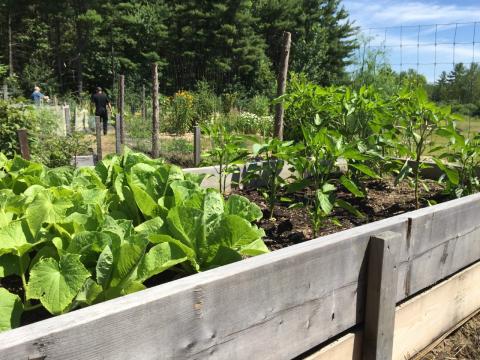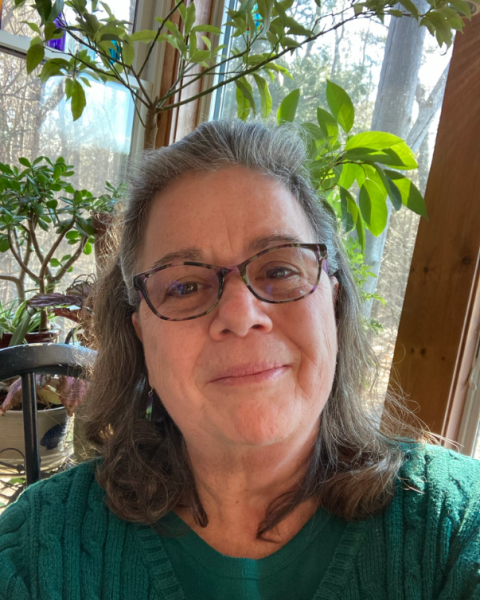Manchester Community Gardens- Silver Lining Stories from a COVID Growing Season

For over 20 years Natural Resources Stewards have been helping Manchester residents and organizations create, design, organize, manage, and maintain community gardens in the city. Even with a late start last year and the challenges of the pandemic, they carried on, and their stories illustrate that it was all worth it.
Ara Tamzarian, Manchester Grows - With the onset of the pandemic in early 2020, Manchester community gardens were quickly turned into production gardens to provide food for people in need. Natural Resources Steward Ken LaQuire received a call that there were some flats of starts to be donated to the community garden. He showed me a list and gave a location. I knew of His Mansion Ministries and actually had been up on the hill at one point. Thus, I knew where we were going. As we drove there talking, we anticipated something along the lines of a dozen or so flats of starts.
When we got there and were brought to the greenhouse, they opened the doors and told us that the whole left line of starts was available to us if we wanted it...approximately 40+ flats with an estimated 1,300 starts! We looked at each other and decided that we wanted to get as much into the ground as possible, even though it was starting to get on in the season. We were going to do our best with what was presented.
After two trips all the plants were moved and many distributed to other community gardens (including the NH Food Bank garden), but we still had a ton left! We had to make space (as we did not have anything prepped ahead) and with the help of all our volunteers, within a couple of weeks we got everything in the ground across three new production fields.
Special thanks goes out to Natural Resources Stewards: Jan Litvin, Peeps Bogaert, Jenn Solmes, and Ken LaQuire. In the face of the challenges of the COVID-19 pandemic Parkside Community Garden, Manchester Community College Garden, and Cannonball Field were all turned into production gardens to produce food for those in need. As a result of everything produced, fresh food found its way to many different food lanes throughout the city. Produce was given free to local families, there were public school daily food giveaways, and produce was donated to Food for Children, New Horizons, ORIS, and many local restaurants and bakeries.
We delivered to 13 restaurants and five bakeries by the end of the season. We then created even more food lanes by holding Harvest Dinners at the Webster House on Wednesdays in October. We also held Thanksgiving dinners with the YWCA Center of New Immigrants. Five hundred pounds of our tomatoes were processed with ORIS into sauces which could then be placed into different food lanes.
As the season was wrapping up some of the plants were transplanted by our volunteers and continue to grow in a city greenhouse we utilized this winter. We have just started our seeds there this with the hopes that we can continue providing food for this year. In all, our volunteers (including several Natural Resources Stewards) put in 820 hours in 2020 (up from 500 hours in 2019) and produced 950 lbs. of tomatoes, 350 lbs. of various additional vegetables, and 3800 grams of basils along with more than eight pounds of various herbs!
Growing Community – Jan Litvin, NRS and Manchester Grows - Thanks for keeping the Parkside and Manchester Community College gardens in the UNHCE network! I think I have gained more from the gardens than I gave. The production work during the unsettling days of the pandemic was soothing for mind and body.
While working at the Parkside Community Garden, there were three young cousins, new Americans from Africa, who were a joy. I was removing bush beans from a raised bed to make more room for the squashes and new greens. The two girls and a boy stopped by and watched from outside the fence. They said they liked beans. I pulled the vines outside the fence and asked if they would like to clear all the beans off and take them home. Yes, please! We had extra plastic bags for them. They said that next year they would like their families to grow some at the community garden.
A neighbor who has been vegetable gardening for many years also stopped by to talk about her garden. She wasn't looking for a spot, only to offer any guidance she could provide to beginners. Another neighbor asked if she could have any leftover green tomatoes at the end of the season. She received two plastic bags full and said that she had an old neighborhood recipe for piccalilli relish. She had been working from home and had watched the garden all season. Previously she had been opposed to the creation of a community garden. There was a definite change in her attitude!
Another woman walking to work was looking to purchase some vegetables. She had walked from the other side of town. We packed up some herbs and vegetables and said there was no charge. She returned the following week before we had started harvesting. I asked if she could stop by on her way home. She said she was working until ten that night. We quickly harvested a bag for her to carry!
All the people we spoke with were pleased that there is now a garden in their neighborhood. Some had no intention of growing anything, but nevertheless were happy to know that the garden is there. The granite benches just outside the garden are used frequently by all ages.
With the 2021 community garden season starting up, we invite all Stewards to come and experience these diverse and special places that nurture the body and the soul.
